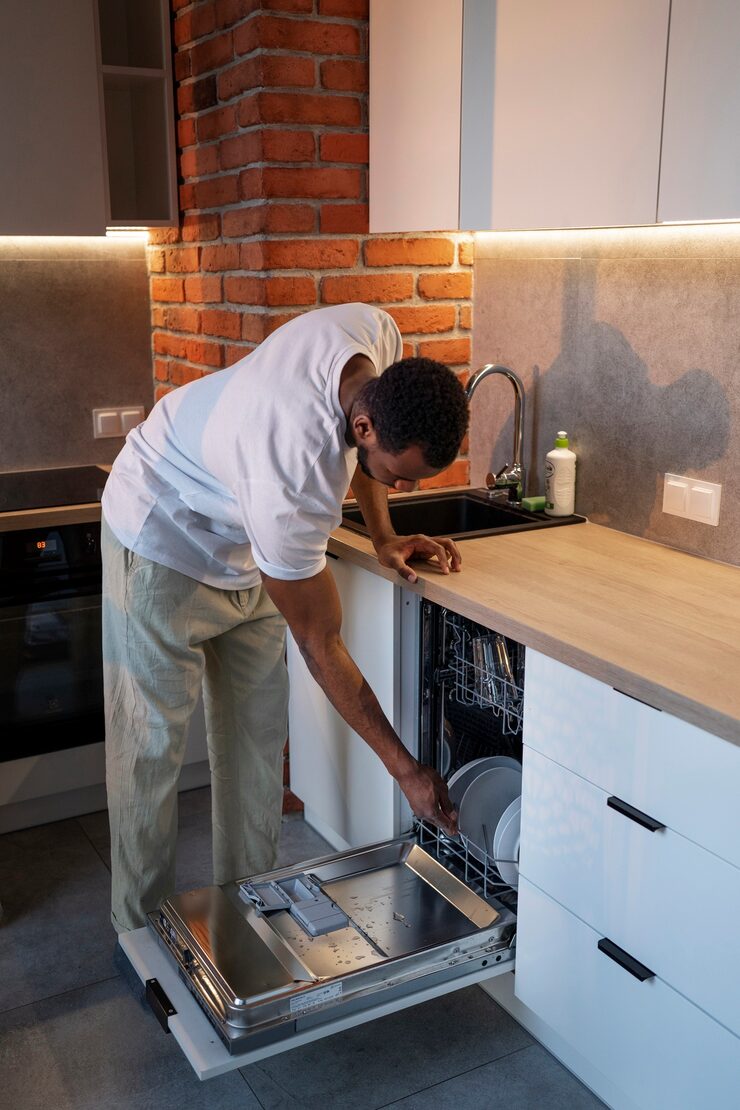A dishwasher is one of the most convenient appliances in any kitchen, saving time, effort, and water compared to handwashing dishes. Knowing the basics of dishwasher repair can save you money, extend the lifespan of your appliance, and prevent small problems from turning into costly repairs.
In this guide, we’ll cover the most common dishwasher issues, simple troubleshooting tips, and when it’s best to call in a professional.
Common Dishwasher Problems
Over time, dishwashers can develop a range of issues, from not cleaning dishes properly to making unusual noises.
- Dishes Aren’t Getting Clean
If your dishwasher isn’t cleaning dishes effectively, it could be due to clogged spray arms, a dirty filter, or hard water deposits. Food particles can build up in the filter, preventing water from flowing freely.
- Dishwasher Won’t Start
If your machine doesn’t turn on, first check the power supply and door latch. Sometimes, the issue is as simple as the door not being closed properly. If the power supply is fine, you may need to look at the control panel or timer.
- Water Not Draining
A clogged drain hose or a blocked filter is the most common reason for standing water at the bottom of your dishwasher. Regularly cleaning the filter and ensuring the hose is clear can prevent this problem.
- Strange Noises
Grinding or rattling noises can indicate a broken pump, debris stuck in the spray arms, or loose parts. Addressing these early can prevent further damage.

DIY Dishwasher Repair Tips
While some repairs require a professional, many dishwasher repair tasks can be done at home with basic tools.
Clean the Filter and Spray Arms
Remove the bottom rack and locate the filter. Rinse it under warm water to remove debris. Use a small brush to clear out the spray arm holes so water flows freely.
Check the Door Seal
Wipe it down with warm soapy water and inspect it for cracks. If damaged, it’s best to replace it.
Inspect the Drain Hose
Ensure the drain hose isn’t kinked or clogged. If water isn’t draining, disconnect the hose and flush it out.
Run a Cleaning Cycle
Grease, food particles, and mineral deposits can build up over time. Run an empty cycle with a dishwasher cleaner or a cup of white vinegar to remove buildup and improve performance.
When to Call a Professional
While DIY methods can solve many issues, some problems require expert help. Call a professional dishwasher repair service if:
- The motor or pump needs replacing
- There’s a persistent electrical issue
- You notice burning smells or sparks
- The dishwasher leaks heavily despite cleaning the seal
Professional repair technicians have the tools and expertise to diagnose problems accurately and replace faulty components safely.
Preventive Maintenance for Longer Lifespan
Regular maintenance is the key to avoiding costly dishwasher repairs. Here are some preventive measures:
- Clean the filter monthly to prevent blockages
- Use dishwasher-safe items only to avoid damaging the spray arms and racks
- Check and clean the door gasket regularly
- Avoid overloading to ensure water reaches all dishes
With proper care, a dishwasher can last 10–15 years, giving you consistent performance and reliability.
Final Thoughts
Dishwasher repair doesn’t always require expensive service calls. By understanding the common issues and taking preventive measures, you can keep your appliance in top condition for years. Whether it’s cleaning filters, checking seals, or calling a technician when needed, a little attention goes a long way in ensuring your dishwasher works efficiently.

